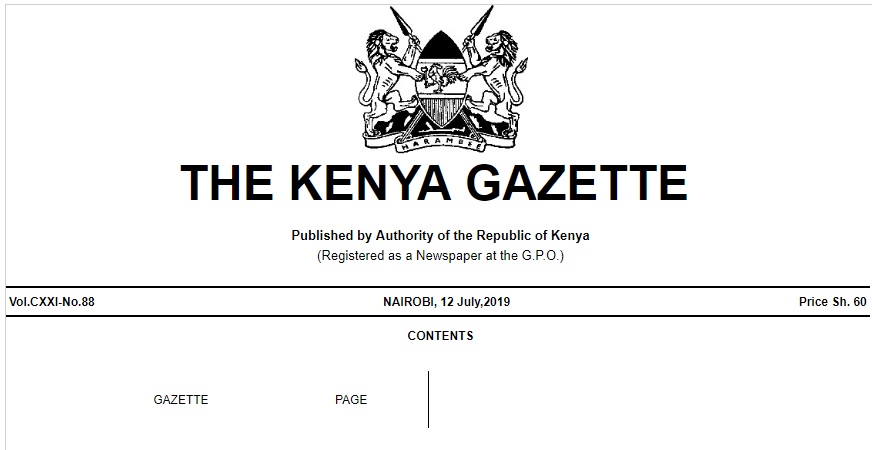Pension Industry in Kenya to finance the Big Four Agenda
Background
Since yesterday we have been engaging in a lot of debate around the new plans by national government to use resources from the pension industry in Kenya (Occupational Retirement Benefit Schemes) to invest in the Big Four Agenda particularly on housing, manufacturing, Universal Healthcare Coverage (UHC) and Universal Healthcare Coverage. The Cabinet Secretary in charge of National Treasury announced a number of amendments proposals towards raising more revenue for financing the Big Four Agenda.
One of those amendments was on the Retirement Benefits Act which was amended through the Finance Amendment Act of 2018.
In his second term, President Uhuru Kenyatta wants to leave a legacy and hence he came up with “the Big Four Agenda” to be achieved by 2022. This includes: i) provision of 500,000 units of social and affordable housing; ii) achieve food security; iii) manufacturing to contribute at least 15% of Kenya’s GDP and iv) Universal Healthcare Coverage.
The accumulated resources will be used for financing the Big Four Agenda in Kenya. In the past, the resources in the pension industry in Kenya are invested in the domestic economy to spur the economy.
The pension industry in Kenya is reported to have an asset base of Ksh. 1.2 trillion as at 31 December, 2018. The Retirement Benefits Authority (RBA) has a mandate of regulating and supervising establishment and management of retirement benefits schemes. Secondly, the Authority advises the Cabinet Secretary (CS) for National Treasury on policies relating to retirement benefits sector.
In my opinion, after the government failed to raise resources from the National Housing Levy Fund with plans to initially deduct 0.5 percent which was later increased to 1.5 percent from all employees in the formal sector’s gross salary, now they are focusing on the billions in the pension industry in Kenya.
My research reveals that Retirement Benefits Authority (RBA) intends to contribute towards three of the Big Four Agenda. That is Universal Health Care Coverage (UHC), manufacturing and Housing.
According to Nzomo Mutuku, the Chief Executive Officer of Retirements Benefits Authority (RBA), the Authority participated in the establishment of Kenya Mortgage Refinancing Company. Secondly, RBA expanded their investment guidelines to allow pension industry in Kenya to invest in Real Estate Trust Funds (REITs).
Further, the RBA a new investment class for Venture Capital and Private Equity to allow schemes to invest up to 10 percent of their assets. These funds will also contribute towards manufacturing agenda.
Pension industry in Kenya provides a number of benefits to members such as financing medical costs after retirement and a source of income among others.
Nzomo Mutuku further states that already 39.4% of funds from the pension industry in Kenya are invested in government securities. These investments are projected to increased in the nearby future.
Proposed changes on the Pension Scheme
Retirement Benefits Authority (RBA) published a notice on Daily Nation dated 18 July 2019. The notice contains 9 proposed changes on the Retirement Benefits Act, Cap 197. Among those proposals is on preservation of benefits under Regulation 19 which is amended in paragraph five (5) by deleting the words “and fifty percent of his employer’s contribution and the investment income that has accrued in respect of those contributions.”
This basically means that employees in the private sector who are contributing towards their retirement will no longer access the 50 percent of employer’s contribution and the income that it has earned over the years. An unofficial conversation with staff at RBA and the Kenya National Treasury revealed to us that a research was done which revealed that most of the millennials who access their pension money before reaching retirement age, use their money on non-beneficial expenditures such as buying luxury items.
My first thought on this research which we’ve not accessed is that the Pension Scheme actors should have conducted a sensitization programme on how millennial can invest better than penalizing them altogether.
I’m further reliably informed that many actors in the Pension industry in Kenya cannot be forced by Retirements Benefits Authority (RBA) to invest in the Big Four Agenda. We know that the Trustees have the power to decide where to invest the Pension Scheme resources. Yes, this is true but we’re all aware that government securities are extremely attractive considering that the possibly of default is zero and the returns are attractive and in line with achieving their bottom line.
Read More: How feasible is the Housing Component of Kenya’s Big Four Agenda?
It was until 17 July, 2019 that it came to our attention that there are new changes in the Pension Industry. It is now clear that Pension Industry is the newest front for financing the Big Four Agenda. However, there are casualties whenever new changes emerge in any place.
Read More: Treasury CS Henry Rotich budget statement FY 2019/2020
The final worry for millennial is that Kenya’s life expectancy is pegged at 64 years for men and 68 years for women and considering the many challenges that they are facing, they feel that it is better they access their pension billions now. In fact, they may be able to invest that money in ventures which can spur economic growth and create the most sought employment for the youth.
References
Government of Kenya, Legal Notice No. 88 of 2019
Government of Kenya, (2019). Kenya bars early access to pension money. Published on Daily Nation on 17 July, 2019.
Retirement Benefits Authority Notice (2019). Pension Industry and the Big Four Agenda. Published on Daily Nation newspaper dated July 18, 2019 (p. 40);
Read More: Economic growth vs Economic Development



3 thoughts on “Pension Industry in Kenya to Finance the Big Four Agenda”
Comments are closed.